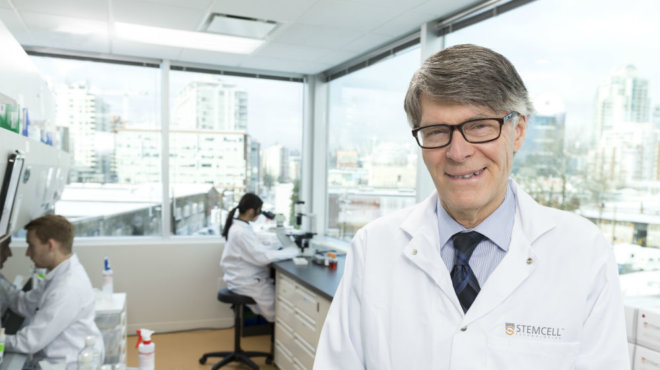
Allen Eaves (MSc’67, MD’69): Innovating cancer research
By Mark Campbell
When your field of interest is cancer, and funding is hard to source, you find innovative ways to carry out your work. Just ask Allen Eaves (MSc’67, MD’69) who used urine from patients with anemia to raise several million dollars in funding for the Terry Fox Laboratory in Vancouver, BC.
Dr. Eaves, who served as director of the lab for 25 years, explains urine from anemia patients contains a hormone, erythropoietin, which can be used to help grow blood-forming stem cells for medical research. “We developed a way of purifying the erythropoietin from urine and sold it to researchers around the world,” he says. “With this money we were able to help build the lab, hire young scientists, and give them startup packages to help them initiate their own cancer research programs.”
Innovative ideas
It is anecdotes such as this—and there are many of them—that demonstrate why this Nova Scotia-raised Dalhousie alumnus is a true innovator in the field of cancer research. From co-founding the Terry Fox Laboratory at the British Columbia Cancer Centre with his wife, Connie Eaves (who is a PhD cell biologist) to their groundbreaking work that led to a new treatment for chronic myelogenous leukemia, to leading the development of one of Canada’s first bone marrow transplant programs, his has been a career of firsts. And yet, Dr. Eaves is not one to rest on his laurels or spend much time talking up his achievements.
“Cancer research is a constantly evolving field,” he says. “There are discoveries being made all the time, which is exciting. But you’ll find that researchers like myself are a modest bunch. We don’t want too much credit for anything because we’re always building on the shoulders of those who went before us.”
Stem cell biology pioneers
In Dr. Eaves’ case, the shoulders he is building on are those of Canadians Jim Till and Ernest McCulloch, whose pioneering work in the field of stem cell biology paved the way for his own innovative biotech venture, STEMCELL Technologies. Launched in 1993, the company, which produces specialty tools and services for life sciences research, was inspired in part by Dr. Eaves’ experiences working with Till and McCulloch in the 1970s but also his own struggle to create quality cell cultures with which to conduct cancer research at the Terry Fox Lab in the early 1980s.
“At the time, everyone was making their own cultures, so it was difficult to compare results from one lab to another,” says Dr. Eaves, who serves as the company’s president and chief executive officer and is the sole shareholder.
“What we did at the Terry Fox Lab was develop a standard culture media for growing blood-forming stem cells. Demand for the product inspired me to launch the business. I often say we provide the picks and shovels for the stem cell and regenerative medicine gold rush because our products are helping researchers make breakthroughs in new treatments for patients.”
Personal connections
Dr. Eaves’ legacy of innovation seems to be the result of nature as much as nurture. His father, Charles Eaves (LLD’00), revolutionized the way apples are stored, significantly extending their shelf life, and his great grandfather (T. T. Vernon Smith) built the railway system that connected Windsor to Yarmouth. Always interested in science, he had envisioned a career as a marine biologist until a family friend died of cancer. That personal connection prompted him to shift his academic focus to medicine and it was the mentors he encountered at Dalhousie that helped him hone his research skills.
“Ross Langley (MD’57), who was head of clinical hematology, was my role model,” Dr. Eaves says. “He encouraged me to go to Toronto and earn my PhD and that’s how I came to work with Till and McCulloch. But Dalhousie is where I got my start as a researcher, and I feel a strong loyalty to it. That experience will always be part of me and I’m grateful for the constant stimulation and learning I received from my professors.”
The future of health care
Dr. Eaves’ groundbreaking work continues, but with a slight shift in focus. Having built STEMCELL into the largest biotech company in the country, with 1,000 employees and 20 per cent annual growth, he now wants to help make Canada a world leader in biotechnology.
“We have a health care system that is a huge cost centre,” Dr. Eaves says. “I want to see a commercial culture of scientific excellence in health care that takes hold here. That way, we can turn it into a revenue generator that not only employs bright young Canadians but also helps people live longer and healthier lives. That’s my goal.”
Photo credit: Kevin Hardiman